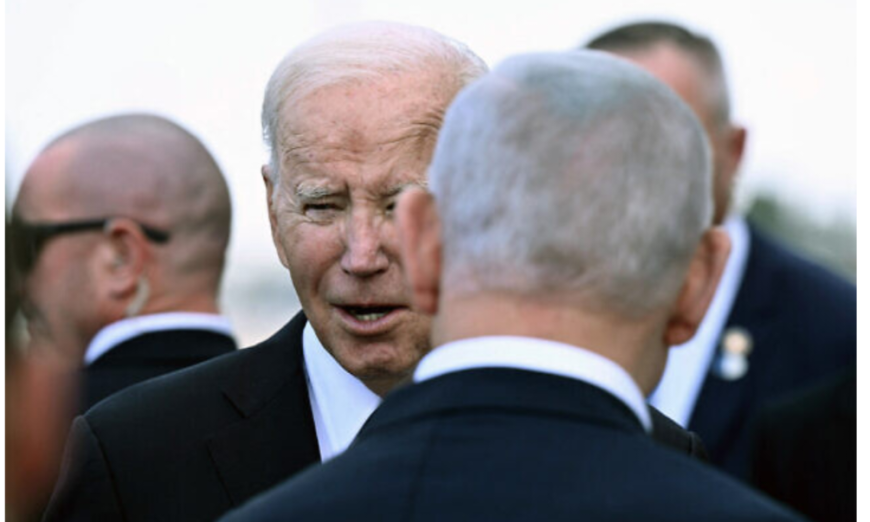Prime Minister Benjamin Netanyahu (back) greets US President Joe Biden upon his arrival at Ben Gurion International Airport, October 18, 2023.
In 45-minute call after US president said Gaza campaign is ‘over the top’, two leaders discuss ongoing war against Hamas, efforts to release remaining hostages held by terrorists.
US President Joe Biden told Prime Minister Benjamin Netanyahu on Sunday that Israel should not go ahead with a military operation in the densely populated Gaza border town of Rafah without a “credible” plan to protect civilians, according to the White House.
The call lasted about 45 minutes, a senior administration said afterward, and it was the first conversation between the two leaders since Biden said Israel’s Gaza response was “over the top.”
It also came as Egyptian officials and a Western diplomat said Egypt threatened to suspend its peace treaty with Israel if it sends troops into Rafah, where Cairo fears fighting could force the closure of the besieged territory’s main aid supply route.
The threat to suspend the Camp David Accords, a cornerstone of regional stability for nearly a half-century, came after Netanyahu said sending troops into Rafah was necessary to win the four-month war against Hamas. He asserted that Hamas still has four battalions there.
Over half of Gaza’s population of 2.3 million has fled to Rafah to escape fighting in other areas, packed into sprawling tent camps and United Nation-run shelters near the border. Egypt fears a mass influx of hundreds of thousands of Palestinian refugees who may never be allowed to return.
Netanyahu, in extracts of an interview published Saturday evening, insisted the Rafah operation would go ahead “while providing safe passage for the civilian population so they can leave.”
When pressed about where the population was supposed to go, Netanyahu said in the interview aired Sunday: “You know, the areas that we’ve cleared north of Rafah, plenty of areas there. But, we are working out a detailed plan.”
Hamas’s Al-Aqsa television station quoted an unnamed Hamas official as saying that any invasion of Rafah would “blow up” talks mediated by the United States, Egypt, and Qatar aimed at achieving a ceasefire and the release of hostages held by the terror group in Gaza.
“Under current conditions, we… cannot support a military operation in Rafah because of the density of population,” said the senior administration official briefing reporters on the call.
The official noted that Israeli leaders have made clear to their American counterparts that a “precondition” to any Rafah operation would be moving the population there out of harms way. “We have stated our concerns about how that could even be feasible,” the official said, appearing not to rule out the US signing on on another mass-displacement of Palestinians in Gaza but also indicating that Washington’s approval for the move will be harder to receive than it was in earlier stages of the conflict.
“You have 1.3 million people in Rafah, and they have nowhere to go. They would obviously have to move and be sustained and be supported,” the senior US official said.
The war erupted with Hamas’s October 7 massacres, which saw thousands of terrorists burst across the border into Israel by land, air and sea, killing some 1,200 people and seizing over 250 hostages, mostly civilians, many amid horrific acts of brutality and sexual assault.
Vowing to destroy Hamas, Israel launched a military campaign in Gaza which local health authorities said Sunday has left at least 28,000 dead since the start of the war. The figures issued by the Hamas-run health ministry cannot be independently verified, and are believed to include both civilians and Hamas members killed in Gaza, including as a consequence of terror groups’ own rocket misfires. The IDF says it has killed over 10,000 operatives in Gaza, in addition to some 1,000 terrorists inside Israel on October 7.
According to a White House readout the two leaders also discussed “ongoing efforts to secure the release of all remaining hostages held by Hamas,” along with increasing the “throughput and consistency” of humanitarian aid to Gaza civilians.
The senior administration official said a third of the conversation was devoted to discussing a potential hostage release deal. The official said that the sides have agreed to a framework after overcoming significant obstacles earlier on and that forthcoming negotiations would focus on closing the remaining gaps.
The US official also affirmed Israel’s position that a deal would only be possible if Hamas is under pressure — and that the same had been communicated to Egypt and Qatar, who have been the leading mediators in the negotiations.
“You will not get a hostage deal unless Hamas is under significant pressure… and we have made that clear to the Egyptians and the Qataris. The [IDF’s] pressure on the ground, particularly in Khan Younis is real,” the official adds.
Biden also “reaffirmed our shared goal to see Hamas defeated and to ensure the long-term security of Israel and its people” and “discussed ongoing efforts to secure the release of all remaining hostages held by Hamas,” the readout added.
Regarding humanitarian aid, Channel 12 reported that Biden queried Netanyahu on whether trucks were passing through the Kerem Shalom crossing, given weeks of protests at the border against sending assistance for Palestinians while hostages kidnapped during Hamas’s October 7 massacre remain in the enclave.
Biden and Netanyahu agreed to remain in close contact, according to the readout.
The Ynet news site reported that Biden also encouraged Netanyahu to send a delegation to Cairo this week to join talks with mediators on a potential truce. CIA Director William Burns is expected to arrive in Egypt on Tuesday, while Israel was reportedly planning to send negotiators including Mossad spy agency chief David Barnea and Shin Bet security agency chief Ronen Bar.
Netanyahu has previously called Hamas’s demands — which include a permanent ceasefire, a withdrawal of troops from Gaza, reconstruction of the enclave, and some 1,500 Palestinian prisoners, including terror masterminds, in exchange for the remaining hostages – “delusional.”

